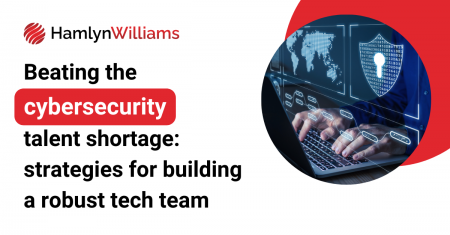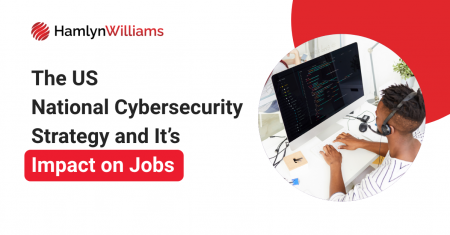The cybersecurity landscape is constantly evolving, driven by the rapid pace of technological advancements. As we welcome new technologies, the challenges in safeguarding sensitive data also intensify. In this article, we have examined five of the top cybersecurity trends that are set to shape the industry in 2024 and have explored the corresponding career paths for those looking to navigate this dynamic field.
AI and Machine Learning Threats
The integration of AI and machine learning introduces more sophisticated cyber threats. According to National Cyber Security Centre, AI is set to see a dramatic increase in the number of cyber-attacks over the next couple of years. Threat actors leverage these technologies to craft intricate attacks, as seen in the rise of AI-driven phishing attempts. Cybersecurity experts must understand AI's capabilities and risks to counteract evolving threats. Due to this, companies may look to strengthen their team with hires covering roles such as:
-
Incident Responder
-
Security Engineer
-
Cybersecurity Manager
The rise in AI and machine learning threats has the potential to impact various other teams too. Here are some roles that could be influenced by the increasing sophistication of AI-driven threats:
- Data scientists responsible for developing machine learning models may need to focus more on implementing security measures within their models to prevent malicious use or exploitation. Data scientists might focus on integrating security features into machine learning models, ensuring that models are resistant to adversarial attacks, and implementing measures to identify and mitigate security vulnerabilities. They might also work on projects such as monitoring and responding to AI-driven threats, or even developing AI-powered security software.
- Ethical hackers or penetration testers are responsible for testing the security of systems and may need to adapt their methodologies to include AI-driven attack scenarios. Understanding how AI can be used maliciously is crucial for identifying vulnerabilities.
- Cybersecurity analysts monitoring and responding to cyber threats will need to stay updated on AI-driven tactics. This includes analysing patterns and behaviours to distinguish between legitimate and malicious AI-generated activities.
- Risk analysts responsible for assessing and mitigating risks in an organisation will need to include AI-related risks in their evaluations. This involves understanding the potential impact of AI-driven threats on business operations.
- Legal and compliance experts may need to navigate new regulatory landscapes related to AI and machine learning security. Understanding the legal implications of AI-driven attacks and ensuring compliance with data protection laws becomes crucial.
Remote Work Data Protection
The rise of remote and hybrid work models brings about new challenges for cybersecurity. With a significant percentage of the workforce operating from various locations, the risk of data breaches amplifies. Cybersecurity professionals need to implement additional measures such as VPNs and anti-virus software to ensure data security. While strengthening your cyber security team to meet this trend, common roles hired include:
-
Network Administrator
-
System Administrator
-
Information Security Analyst
-
Security Architect
“Once the malware has breached a home network, it can then move laterally across to the homeowner’s work network, inflicting significant damage to the organisation. With IoT devices being the perfect target for malware, vendors must ensure that their products have effective security.” - Sunil Ravi, Chief Security Architect at Versa Networks
While there is an obvious and immediate need for technical support to counter challenges arising from this trend, the impact of remote work and the data protection issues surrounding work outside of the office may also need to be considered. Here are some other teams that can help strengthen your company’s cyber security protocols:
- Human resources teams may need to work closely with cybersecurity professionals to ensure that remote employees' personal and sensitive data are handled securely. They may also be involved in creating and communicating policies related to data protection for remote workers.
- Legal and compliance teams will play a critical role in ensuring that remote work practices align with data protection regulations and compliance standards. They may need to develop new policies or update existing ones to address the unique challenges posed by remote work.
- Training and development specialists can contribute by developing training programs that educate remote employees about cybersecurity best practices. This includes raising awareness about potential threats, emphasising the proper use of security tools, and fostering a culture of data security among remote teams.
- Internal communications become increasingly important with the rise in remote work and is crucial for distributing information about data protection measures. Internal communications managers will need to develop strategies to effectively communicate cybersecurity policies, updates, and best practices to remote teams.
- Facilities managers may need to collaborate with IT and cybersecurity teams to ensure that physical aspects of remote work, such as home office security and access control, are considered. This could involve providing guidelines for secure home office setups or facilitating the distribution of secure equipment.
- Employee Assistance Program (EAP) coordinators might play a role in supporting employees dealing with the stress and challenges of remote work. This may include providing resources on cybersecurity best practices, addressing concerns about data security, and offering support for maintaining a healthy work-life balance.
- Finance and accounting professionals handling sensitive financial data may need to adapt their practices to ensure secure communication and transactions in a remote work environment. This includes implementing secure payment processes and reinforcing the protection of financial information.
Innovation in Multi-Factor Authentication (MFA)
As the importance of MFA rises, particularly with the vulnerabilities associated with SMS-based authentication, there's a need for innovation. Companies will pivot towards more secure MFA apps, creating opportunities for:
-
Security Systems Administrators
-
Security Engineers
As the landscape of cybersecurity evolves with the emphasis on secure authentication, there are many roles that will play integral parts in ensuring the effectiveness and widespread adoption of innovative multi-factor authentication methods. Here are some roles that could be influenced:
- User experience (UX) designers for authentication apps are in increasingly high demand and, with the shift towards more secure MFA apps, will play a crucial role in creating intuitive and user-friendly interfaces for authentication processes. Ensuring a seamless user experience is vital for the widespread adoption of MFA solutions.
- Mobile app developers will be needed to support the growing demand by companies to develop secure MFA apps. Mobile app developers will be needed to create robust and reliable authentication applications for both iOS and Android, meaning a need for developers who specialise in security protocols for each of these operating platforms.
- Cybersecurity consultants will see increased demand as companies seek expert advice on implementing and optimising multi-factor authentication solutions. They will be tasked with guiding companies to select the most suitable MFA technologies and ensuring proper integration within existing security frameworks.
- Compliance and regulatory specialists may see changes in regulatory requirements and compliance standards with ongoing innovation in MFA. Specialists in compliance and regulations will be essential to navigate and ensure that organisations adhere to evolving security standards related to authentication methods.
- Technical writers will be needed to create comprehensive security documentation with the introduction of new MFA technologies. They will be needed to cover a range of documentation including user guides, API documentation, and security best practices to assist both internal teams and end-users in understanding and implementing MFA solutions.
- Identity and access management (IAM) specialists will be critical in implementing and managing the integration of MFA solutions within the broader identity and access control framework. They will ensure a coherent and secure authentication process across various systems and applications.
- Network security analysts will need to adapt their skills to monitor and analyse the impact of MFA implementations on network traffic and overall security. They play a vital role in identifying and responding to any anomalies or potential threats.
- Incident response teams will need to incorporate MFA-related incidents into their protocols. This includes developing response plans for potential MFA breaches and ensuring swift and effective mitigation strategies.
- Sales and marketing professionals will find new opportunities to promote and sell these advanced authentication solutions. They will need to effectively communicate the benefits of the new MFA technologies to potential clients and stakeholders.
Attacks on Cloud, Mobile, and IoT
The widespread presence of technology in our lives increases our vulnerability. As reliance on mobile apps, the cloud, and IoT grows, so do the opportunities for cyber threats. For companies to combat attacks on these fronts, there is a growing demand for cybersecurity professionals with expertise in areas such as:
-
Security Systems Administration
-
Security Engineering
-
Security Architecture
The rise in attacks on Cloud, Mobile, and IoT has significant implications for various roles across different industries. Beyond cybersecurity roles, several other positions may be impacted due to the evolving threat landscape. Here are some roles that could be affected:
- IT managers and directors are responsible for overseeing technology infrastructure, including cloud services, mobile device management, and IoT implementations. Increased cyber threats may necessitate a reassessment of security protocols, resource allocation, and strategic planning to ensure the resilience of IT systems.
- System administrators play a crucial role in configuring and maintaining IT systems. With the heightened risk of attacks on cloud and mobile platforms, system administrators may need to implement additional security measures, conduct regular audits, and ensure that software and systems are up to date.
- Application developers focusing on cloud-based applications, mobile apps, and IoT devices will need to integrate robust security measures into their coding practices. Secure coding practices, encryption, and regular security testing become imperative to mitigate vulnerabilities.
- Compliance and risk management professionals will need to stay abreast of evolving cybersecurity threats related to cloud, mobile, and IoT. They may need to update compliance frameworks and risk assessment strategies to address new challenges and ensure regulatory compliance.
- Network administrators who manage the organisation's networks will need to enhance network security protocols to protect against cyber threats targeting cloud and mobile infrastructures. Implementing firewalls, intrusion detection systems, and monitoring network traffic become critical.
- Data privacy officers must revise and reinforce data protection policies to consider the increased vulnerability of data stored in the cloud and accessed through mobile and IoT devices. Ensuring compliance with data protection regulations and safeguarding sensitive information become paramount.
- Procurement and vendor management professionals responsible for procuring cloud services, mobile devices, and IoT solutions will need to evaluate vendors not only based on functionality but also on the security measures implemented. Assessing vendor security practices becomes a critical aspect of procurement.
Open-Source Code Risks
While open-source code facilitates development, it also comes with inherent security risks. A substantial percentage of open-source software contains vulnerabilities. With an increase in open-source code comes a growing need for cybersecurity experts to review and test open-source code for security gaps. Jobs in this trend include:
-
Penetration Tester
-
IT Auditor
The growing trend in open-source code risks in the cybersecurity industry can impact various roles beyond these though. As the cybersecurity landscape evolves, the demand for specialised roles addressing open-source code risks is likely to increase, creating diverse opportunities for professionals across various domains within the industry. Here are some additional roles that could be influenced:
- Security analysts may need to specialise in assessing and mitigating risks associated with open-source code. They play a crucial role in monitoring and responding to security incidents related to vulnerabilities in open-source software.
- DevSecOps engineers integrate security practices into the software development lifecycle. With open-source code risks on the rise, these professionals become instrumental in implementing security measures at every stage of development.
- Vulnerability and cybersecurity researchers can contribute to identifying and understanding potential risks. Researchers focusing on trends and emerging threats in the realm of open-source code vulnerabilities can contribute to the development of advanced security measures and countermeasures.
- Incident responders must be prepared to address security incidents stemming from vulnerabilities in open-source code quickly. They play a critical role in minimising the impact of security breaches and implementing corrective measures.
- Compliance analysts ensure that organisations adhere to cybersecurity regulations and standards. As the risks associated with open-source code become more pronounced, these professionals may need to update compliance protocols to address these specific challenges.
- Legal and regulatory specialists may need to navigate the legal implications of open-source code risks, ensuring companies are compliant with relevant laws and regulations.
- Security automation engineers can develop and implement automated tools and processes to continuously monitor and evaluate the security of open-source code, allowing for more proactive risk management.
Remember
The rapidly evolving landscape of cybersecurity in 2024 brings to the fore a dynamic set of challenges as well as opportunities. With the integration of AI and machine learning in cyber threats, the demand for skilled professionals such as Incident Responders, Security Engineers, and Cybersecurity Managers intensifies. Similarly, the surge in remote work models necessitates the strengthening of cybersecurity teams with roles like Network Administrators and Information Security Analysts.
But the impact of cybersecurity spans across numerous teams, including legal and compliance, human resources, training and development, and internal communications, highlighting the interdisciplinary nature of securing digital landscapes in the face of evolving threats. As we navigate these trends, collaboration and adaptability emerge as key attributes hiring managers are looking for in their candidates as they narrow in on individuals who will thrive in the cybersecurity sector.
The cybersecurity sector offers a dynamic and rewarding career path with high demand, lucrative salaries, and significant growth potential. As the industry evolves, professionals equipped with the right skills and expertise will play a crucial role in securing our digital future.
If you would like to discover how we can help you strengthen your cyber practices and build out your team, head to the Hamlyn Williams contact page and get in touch today.



















